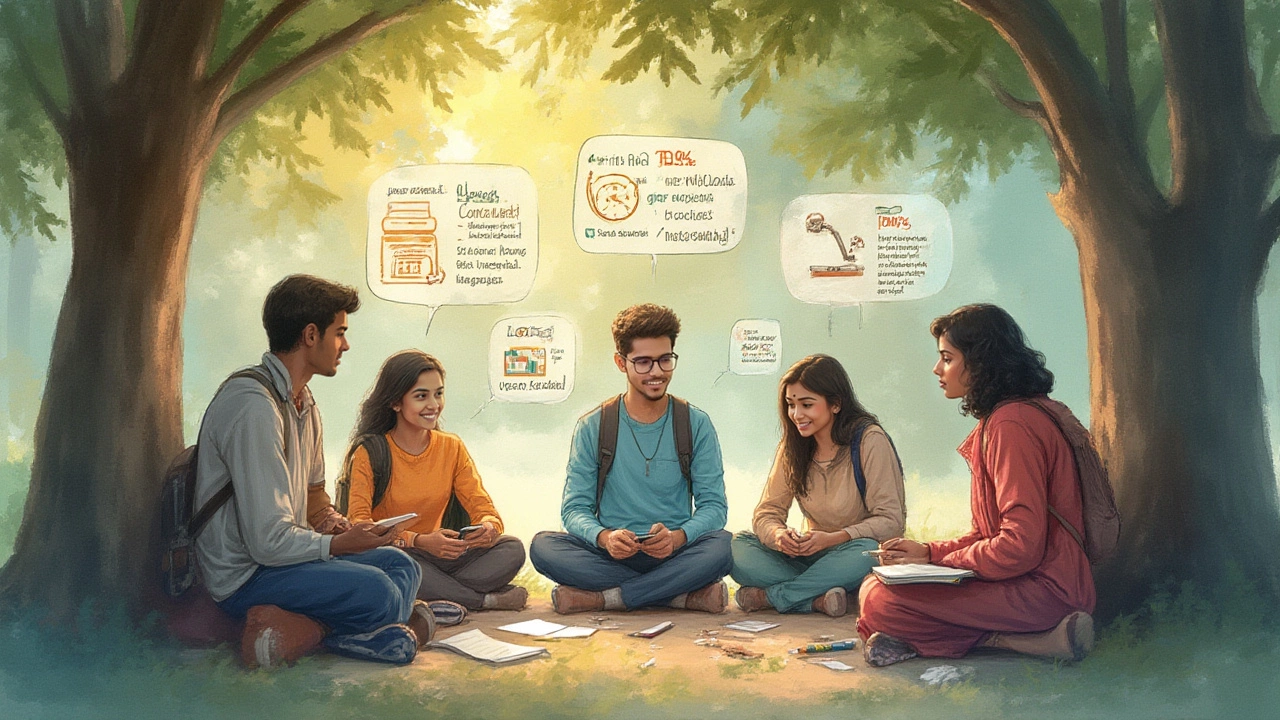Cracking NEET isn’t just about reading fat books or sitting in endless classrooms. There’s this cloud of confusion: coaching, self-study, online platforms, test series, revision notes—the list goes on. Parents, friends, neighbors, sometimes even random uncles with no science background, everyone seems to know which method works best. Google 'best for NEET preparation', and you’ll enter a noisy maze. Some students topple AIR (All India Rank) lists by locking themselves at home with books and digital tablets, while others swear by coaching classes. There isn’t one formula. The real trick is personalizing your approach—figuring out what suits your style, stamina, and schedule. So let’s break down the most popular options, bust some myths, and check the real facts and numbers behind every path to NEET success.
Is NEET Coaching Essential? Examining the Landscape
Step into any student neighborhood in a city like Kota or Hyderabad, and you’ll find more coaching centers than grocery stores. It’s not superstition. Nearly 65% of NEET qualifiers in 2024 attended structured coaching, according to NTA data. That’s a whopping majority, but does it make coaching a must? Not always. Coaching centers, whether big brands like Aakash or Allen or smaller local institutes, come packed with regular classes, doubt sessions, peer comparison, and that dreaded weekly test everyone moans about. Here’s the upside—you get a mapped-out syllabus, teachers repeatedly drilling concepts, handouts and exclusive modules, and a schedule you can’t easily shrug off.
Another strong point: competition. Sitting in a classroom surrounded by hundreds of serious faces nudges your brain. If you’re the sort who’s drawn into group energy, coaching can be a motivator. You’ll also be hit by competitive mock tests. These aren’t just random practice papers—they often mirror the real NEET exam question structure, which helps sharpen your speed and accuracy. Sparkling air-conditioned halls and fancy smart boards don’t guarantee results, though. Some batches are so huge, you may barely interact with teachers unless you shout your doubts. The sad fact: even high-fee coaching centers post dropout rates of 10–15% per year, mostly because the environment exhausts students mentally and physically.
Take note: coaching is an investment—not just financially, but in dedication. It suits students who need hand-holding, fixed routine, and quick access to teacher support. Choose wisely; the NEET coaching industry is valued at around ₹7,000 crore as of 2024, so marketing pressure is high. Ask for demo classes, get honest reviews from current students, and check faculty qualifications. Never fall for the old trick of toppers claimed as their own after just a month of enrollment.
Self-Study for NEET: Reality, Responsibility, and Resources
Look at the other camp. Stories of self-study toppers keep popping up on YouTube and NEET forums. Is it just social media hype? Not really. A little under 30% of NEET top 100 rankers in 2024 reported relying mainly on self-study, often using online resources, open-source materials, and old-school NCERT books. That’s not a small fraction. Self-study puts you in direct control. You create your timetable, skim your weak zones, and set the pace. No need to wake up at 5 a.m. unless you want to. You decide if an entire week should go to Human Physiology or Organic Chemistry. This freedom attracts disciplined students—those not easily distracted by scrolling Instagram or the occasional afternoon nap.
But there’s no free lunch. Self-study demands planning and brutal honesty. You can’t trick yourself into a feeling of fake progress just by highlighting textbook lines. Smart self-studiers often break topics into micro goals, use weekly targets, and monitor scores empirically. There are tools now: Google Calendar for scheduling, Pomodoro timers for short sprints, and active recall apps like Anki. Did you know? According to the latest data from NCERT, nearly 85% of NEET biology questions are based directly from Class XI and XII textbooks—these books have no cost if you’re sharp about using them right.
It helps to have your own feedback loop. Join free NEET WhatsApp groups, post doubts on forums like Doubtnut or Quora, and review answer keys after every mock. Another hack—record yourself explaining topics aloud. If you sound confused, you probably are. Also, watch out for isolation. Self-study can turn you into a lone wolf, so it’s crucial to schedule catch-ups with peers or online study partners who don’t let you slip into comfort zones.

Online NEET Platforms: The New Game-Changers
The old classroom has gone digital, especially after 2020. Online NEET platforms like BYJU’S, Unacademy, and Physics Wallah grabbed lakhs of students. These don’t just offer video lectures—you get on-demand doubt clearance, flash cards, adaptive quizzes, and AI-powered progress reports. About 40% of candidates in 2024 signed up for at least one online NEET course on top of other methods.
What’s the real edge? You get to pause, rewind, or revisit any tough topic as many times as you want. Missed the morning session because of a late-night revision? No problem—watch it at midnight. Some platforms have made their names through quick short-form concept videos under 10 minutes, helpful for last-moment brushing up. Others host daily live quizzes or mega all-India mock tests where lakhs compete at once, which helps you gauge your standing instantly.
Don’t get lost in the range of options, though. Check if your platform offers up-to-date NEET patterns and includes regularly updated question banks (the NEET syllabus and exam structure change nearly every two years). Look for platforms that allow you to interact directly with mentors, not just chatbots. Also, beware of information overload—juggling five apps while watching three video lectures and scrolling PDF notes can fry your brain. Streamline your digital tools and set boundaries: pick one or two credible sources and stick with them.
Time Table, Revision, and Practice: The Cornerstones of NEET Prep
Resources only work when you use them right. You might feel tempted to buy every mock test paper out there, but if you’re not timing yourself and reviewing mistakes honestly, you’re wasting your chance. Success stories in NEET prep almost always have three things in common: a realistic timetable, non-negotiable revision hours, and consistent mock practice.
- Timetables: Don’t make one-time, fancy plans just to pin on your wall. Use flexible timetables. Start with a broad monthly plan (which chapters, major test dates), then break it down to weekly and daily tasks. Factor in real life—school, family events, need for screen breaks.
- Revision: Did you know the average human forgets up to 80% of what they read in 24 hours without revision? That’s why periodic revision cycles matter. Top rankers revise every major topic at least four times. Focus on diagrams and NCERT line-to-line for Biology; formula sheets and error logs for Physics and Chemistry. Make cheat sheets for last-minute revision, especially for factual lists (think plant taxonomy, periodic table trends).
- Practice: NEET isn’t about solving 200 questions per chapter; it’s about picking the most probable and tough ones. Practice previous years’ papers—the NTA’s official question bank is gold. Set up real exam conditions: phone switched off, timer set, rough sheets ready. Afterwards, analyze your patterns. If Physics numericals always eat up your time, slot in high-speed drills every alternate day.
Peers who do this religiously see clear score jumps with each monthly mock. Here’s a sample data table showing student trends from 2023–2024 based on the NEET Udaan Feedback Survey:
| Prep Method | Avg. Score Improvement (12 months) | Dropout Rate |
|---|---|---|
| Coaching Only | +110 marks | 12% |
| Self-Study Only | +95 marks | 9% |
| Hybrid (Blended) | +125 marks | 7% |
Hybrids—using a mix of coaching, online resources, and targeted self-study—showed the biggest improvements with the lowest burnout.

Psychological Factors: Stress, Support, and Self-Care
You can have all the study materials and latest tech, but if your mind cracks under pressure, things go south fast. NEET isn’t just an exam—it’s a year-long emotional marathon. Burnout, anxiety, and even sleep issues plague nearly 50% of aspirants (according to a 2024 NEET Pulse poll). What’s the survivor strategy?
- Stay Active, Not Just Seated: Sitting still for 8–10 hours a day shatters focus. Try short walks, stretching routines, or 15-minute football breaks. Movement triggers dopamine release, boosting memory and mood.
- Talk It Out: Speak with supportive family, school counselors, or even your old school friends. Don’t bottle up stress. Regular venting (not ranting) keeps anxiety in check.
- Sleep Smarter: Most top NEET qualifiers clock 7–8 hours of shuteye—no, those "I study till 2 a.m." stories often end in burnout. Deep sleep cements memory. Try light meditation, digital detox post-dinner, and follow a semi-fixed sleeping slot.
- Balance the Rewards: Set short rewards after tough targets. Finished three practice sheets? Allow yourself an episode of a sitcom or an off-day with friends (not right before the exam, though!).
- Seek Help, Don’t Hesitate: If negative feelings spiral, don’t just ignore them. Free tele-counseling services are now available through NTA partners and platforms like YourDOST or Tata Trust’s wellness programs for exam aspirants.
Healthy aspirants perform better—not just in marks, but in how they handle bad test days and last-minute curveballs in the exam hall. Tier-one coaching centers and some progressive schools now offer regular mental wellness workshops for NEET and JEE batches because it’s honestly that essential.
So, who is *best for NEET preparation*? The real winner is a method tailored to your personality, paced for your lifestyle, and flexible to adjust when you hit unexpected snags. The world’s most expensive coaching is pointless if you don’t gel with forced routines, just as self-study caves can trap those who need outside motivation. Try different combos, track what feels right, and never lose sight of the actual goal: understanding, not just mugging up, as you step into India’s most fiercely competitive medical exam. The hard truth is—every topper’s journey is custom coded. Carve out yours.
